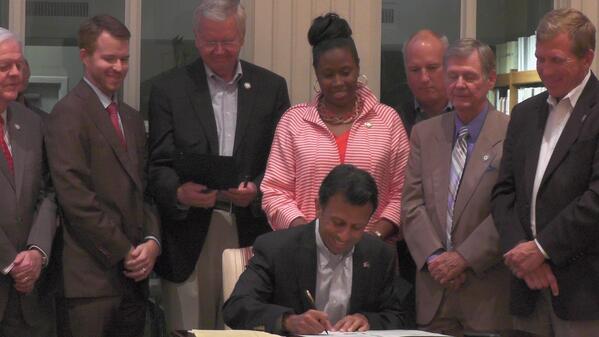Louisiana Gov. Bobby Jindal today signed pro-life bills that could close three of the state’s five abortion clinics. Jindal has been a staunchly pro-life governor and he is putting into law more pieces of pro-life legislation that has, under his administration, made Louisiana one of the most pro-life states in the nation.
The Louisiana state legislature sent to Jindal HB 388, the Unsafe Abortion Protection Act, that the Planned Parenthood abortion business says could close three of the five abortion clinics in the state.
 “This bill will give women the health and safety protections they deserve,” Jindal said.
“This bill will give women the health and safety protections they deserve,” Jindal said.
When the state of Texas clamped down on abortion clinics that could not follow basic health and safety standards and failed to ensure abortion practitioners had admitting privileges at local hospitals in cases where women are injured in botched abortions, abortion clinics closed down because they couldn’t comply. As many as 20 Texas abortion clinics have closed or stopping doing abortions.
Now, Louisiana is following suit.
The pro-life bill will protect women by ensuring that abortionists have admitting privileges at a local hospital, that informed consent protections apply to all abortions, and that facilities that perform more than five abortions maintain proper licensing.
 During the debate, Representative Katrina Jackson (D-Monroe), reminded the committee that HB 388 is about the health and safety of women.
During the debate, Representative Katrina Jackson (D-Monroe), reminded the committee that HB 388 is about the health and safety of women.
Planned Parenthood is complaining the bill will shut down abortion facilities that put women’s health at risk.
Benjamin Clapper, Executive Director of Louisiana Right to Life, told LifeNews previously that the bill would protect women and children:
“Protecting women through common-sense regulations is something we all should stand behind. HB 388 will protect women from the Louisiana abortion industry, which is often more interested in selling abortion, than the health and safety of women. We commend Rep. Jackson for authoring the bill and Sen. Broome for moving this legislation through the Senate Floor,” he said.
Dr. Damon Cudihy, an OBGYN from Lafayette who has treated women who have suffered from abortion complications, said that abortion facilities shouldn’t have “special interest loopholes” that sanction a lower standard of care than what ambulatory surgical centers must have.
Jindal also signed HB 305, authored by Rep. Frank Hoffmann (R-West Monroe), which provides that no representative of a business or organization that performs abortion may provide instruction in schools that receive state funding. This will ensure that organizations with financial interest in abortion, like Planned Parenthood, cannot teach in the state.
The novel pro-life bill that ensures representatives of abortion clinics don’t have access to public schools.
Dorinda Bordlee, senior counsel with Bioethics Defense Fund who has drafted other key bills stopping abortions in Louisiana, tells LifeNews she is available to help other states get this important legislation in place.
“Louisiana families should know that their children aren’t be targeted by groups that have financial incentives to subtly sell abortion and other irresponsible behavior that is dangerous to the health and safety of children,” she said. She aid pro-life groups should work to “stop abortion organizations from accessing school children.”
ACTION: Thank Governor Jindal here.
Why are laws requiring abortion practitioners to hold admitting privileges necessary? Consider Angela’s story.
Angela was twenty weeks pregnant when she walked into a dingy abortion clinic in Santa Ana, California, on August 7, 2004. Her abortion was completed in five minutes with little or no pain relief by an 84-year old abortionist, Phillip Rand, who rotated his time between several clinics throughout Southern California.
When he was done with Angela’s abortion, he got in his car and began the three-hour drive on congested California freeways to another abortion clinic in Chula Vista, near the Mexican border, where he had more patients waiting. But when Angela started bleeding heavily, the two medical aids, who were the only ones left in the clinic, didn’t know what to do. One called Rand and asked him to return to the clinic to help the hemorrhaging women, but Rand refused. He was already an hour or so away and didn’t want to go back and risk losing business in Chula Vista. He told them to call 911 if she got any worse.
Angela did get worse – much worse. By the time paramedics arrived, it was too late. They found her in a pool of her own blood. There was no oxygen or no crash cart at the clinic, but it is doubtful that the two minimally-trained aids would have know how to operate them if they had been available. Angela was transported to a local hospital where she later died.
One paramedic was so incensed by how he found Angela that he reported Rand to his supervisor who, in turn, notified the Medical Board. A signed declaration from the paramedic noted, “This was the worst post-partum patient situation at a medical clinic I have ever encountered during my time as a paramedic.” Twenty months later Rand surrendered his medical license.
For Angela, there was no continuity of care. Rand held no hospital privileges. This allowed him to operate well below the standard of care at the cost of one woman’s life.







